Introduction
Any candidate looking to make a career in finance and/or accounting would be spoilt for choices on offer in form of ACCA & CMA. However, it can get quite confusing for anyone to choose the most appropriate one. The decision becomes critical when it is about your career and future of your family.
We at VGLD are here to guide you in taking the best decision for your future! We will start with taking a quick look at high-level differences followed by a detailed discussion.
Overview of ACCA Course
Below are the key differences between these three courses to give a high-level overview to help facilitate some quick decision-making.
| Nature | ACCA | CMA |
| Organizing Institution | Association of Chartered Certified Accountants | Institute of Management Accountants |
| Number of papers | 13 | 2 |
| Course duration | 3 years | 3 years |
| Frequency of exams | Four times a calendar year March; June; September & December | Three times a calendar year Jan-Feb; May-June; Sept-Oct |
| Course Fees (approx. in INR) | 3,00,000 | 4,50,000 |
| Major skills acquired | Accounting & Taxation | Strategic & Business Management Skills |
Detailed Differences
In addition to above highlighted differences, we will now closely look at each of the key differentiators between these courses so that one can make an informed decision.
- Number of levels & Papers – In order to obtain a full-fledged degree (required to practice profession), a candidate must clear requirements in all the below-mentioned levels. –
Assuming no exemptions are available, a candidate must pass the below sets of papers to be eligible for a full accreditation. These papers are carefully curated to test one’s academic & application skills in fields like accounting, taxation, law, audit etc.
| ACCA – 3 Levels | CMA – 1 Level |
| Applied Knowledge – 3 papers | Part 1 & Part 2 |
| Applied Skill – 6 papers | |
| Professional Level – 4 papers |
- Eligibility – Each of these courses do not limit the intake of students from other streams like science, arts, and others. In fact, a basic graduation in any field gives you a good playing field.
| ACCA | CMA |
| Appear in exam post Higher Secondary (HS) having minimum marks in English and Mathematics/Accounts | Passed 10+2 examinations |
| Students pursuing graduation | Bachelor’s Degree or an equivalent degree from a renowned institute in a relevant field |
Note: Students pursuing graduation can also enroll themselves for US CMA course. They need to submit original certificates or notarized copies in electronic mode within a period of seven years from the date of completion of examinations.
- Practical Training/Experience – Each of these courses require a candidate to undergo few years of work experience/practical training to ensure that the candidates are fully-prepared to handle real-world pressure and challenges.
| ACCA | CMA |
| 3 years of Practical Experience Requirement | 2 years of Continuous Professional Experience |
| Anytime – during or after exams | Anytime – during or within 7 years of passing examination |
- Frequency of examinations – With most students now opting to study and work simultaneously, an increased frequency in number of available terms adds to the flexibility and ease.
| ACCA | CMA |
| Four times a year | Three times a year |
| March; June; September & December | Jan-Feb; May-June; Sept-Oct |
- Format of examinations – All these courses offer different set of exam patterns. Hence, a candidate can choose from the most suitable option.
| ACCA | CMA |
| Multiple Choice Questions (MCQ) | Multiple Choice Questions (MCQ) |
| Scenario-based questions | Essay |
- Job Roles – Both the courses provide ample opportunities to students to make a successful career. Below are typical job roles for which ACCA & CMA members are hired globally for.
| ACCA | CMA |
| Assurance Services | Management Accountant |
| International Accounting | Business Analyst |
| Internal and External Auditing | Project Manager |
| Tax and Financial Planning | Finance Controller |
To view the fee structure, please refer to our video on ACCA exam fees
Conclusion
Having seen above detailed differences, there is no definitive answer to the question on ‘Which is the better course?’ Students are advised to take note of course details and then try to match their aspirations and career goals. Both the courses offer its members golden employment opportunities across the globe. Irrespective of the course duration, number of papers or the cost involved, a decision on the course to be pursued should be solely based on a student’s passion and dreams. Reach out to designated representatives at VGLD who will guide you in this career-changing decision.



